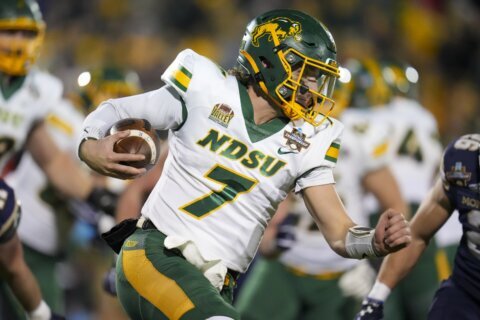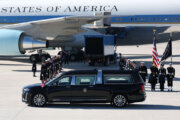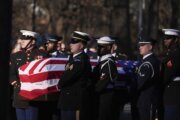FORT LAUDERDALE, Fla. (AP) — In college basketball, the scene of an African American coach cutting down the nets on their way to a national title is not new, even if it is still a relative rarity.
John Thompson led Georgetown to the championship in 1984, the first of four Black coaches to win it all. Carolyn Peck and her Purdue women did it in 1999 and Dawn Staley of South Carolina joined her in 2017 with the first of her three titles.
College football is behind that curve by 41 years and counting, with a chance to finally reach that milestone this year.
The winning coach of Thursday’s national semifinal in the Orange Bowl — either Penn State’s James Franklin or Notre Dame’s Marcus Freeman — will have a chance to become the first Black coach to win a national title at college football’s highest level.
If it happens, it would mark a significant moment. Still, it would come a full generation after college hoops and 18 years after Tony Dungy broke the same barrier in the NFL (in the same stadium where Franklin and Freeman will square off), a league that also has struggled in the area of diversity hiring.
“The fact that we’re celebrating this — it is 2025,” said Richard Lapchick, the founder of The Institute for Diversity and Ethics in Sport at UCF. “That’s a long time coming for that, and it still doesn’t mean a Black head coach will have won that national championship” once the season is over,
Plenty of role models, not enough mentors
Franklin, 52, says he remembers Dungy coaching against Lovie Smith in the 2007 Super Bowl and recognizing “how significant that was in the profession and how significant that was for young coaches coming up in the profession to see those guys in that role.”
At the time, Franklin said, he was working as offensive coordinator at Kansas State for Ron Prince. Prince was one of six African Americans among 120 Division I-A head-coaching positions.
Today, there are 16 coaches in 134 spots at the sport’s highest level. It’s an improvement, but still only represents 11.9% of the positions. In the NFL, Black head coaches hold 18.8% of the spots.
The latest survey by TIDES, in 2022, found that 52.1% of players in top-level college football were Black or identified with two or more races. The split in men’s basketball is 59.6% Black or two-race players and 24.8% Black head coaches. Both Franklin and Freeman are mixed race; Franklin’s mother is white, and Freeman’s mom is Korean.
Sean Frazier, the athletic director at Northern Illinois, wonders if basketball’s generation-sized head start could be thanks in part thanks to the sheer numbers: There are more than 300 schools eligible for March Madness, which is more than double the schools that have a chance to play in the College Football Playoff.
Basketball also had Thompson, Temple’s John Chaney, Nolan Richardson and other top Black coaches paving a road for younger colleagues in a way that hasn’t happened in football.
“It’s not to make any excuses with football,” said Frazier, who is Black, and whose department has won the NCAA’s diversity and inclusion award twice over the last decade. “There have been and continue to be very qualified ethnic racial minority coaches who should be head coaches. And the ones who have to take accountability for that are the presidents and chancellors and directors of athletics who make decisions.”
Freeman’s path was about connections and ability
The 38-year-old Freeman’s path to the edge of the national title game illustrates how connections, along with an innate ability to do the job, can lead to big things. Arguably, one of Freeman’s most important connections early in his career was Black.
He played at Ohio State in the mid-2000s, where one of the assistants was Darrell Hazell. Freeman spent a year as a grad assistant for the Buckeyes, then Hazell, who is Black, hired Freeman when he became head coach at Kent State. Freeman followed Hazell to Purdue.
Freeman’s college teammate at Ohio State, Luke Fickell, brought him onto the staff at Cincinnati. Freeman’s next move was joining the staff at Notre Dame headed by Brian Kelly — who himself had coached at Cincinnati before he went to South Bend. When Kelly left Notre Dame for LSU, Freeman was promoted to Kelly’s old job.
“It’s an honor,” Freeman said of his potentially historic role in this year’s college playoff. “It’s a reminder that you are a representation of so many others who look like you. I don’t take that for granted.”
College sports still ‘average’ at diversity hiring despite NCAA programs
Though Freeman and Franklin both had African American mentors in the business, their rise to the top of their profession is the exception, not the rule.
The NCAA runs the Coaches Academies and Champion Forum, programs designed to build pipelines and mentor young coaches. Its office of inclusion and annual Inclusion Forum bring diversity issues to the fore in a sprawling intercollegiate system that covers around 1,100 schools.
Still, the West Coast Conference’s “Bill Russell Rule,” stands out as the only program in the college space, to Lapchick’s knowledge, that attempts to emulate the NFL’s “Rooney Rule,” which mandates minorities be interviewed for open coaching jobs. The WCC does not have football.
It helps explain why TIDES gave college sports a grade of “C” for its racial hiring practices across all sports in its last survey.
“The NFL has made what I think is going to be a sustained breakthrough,” Lapchick said. “I don’t know that college sports has had that sustained breakthrough yet.”
A chance to improve the numbers
Frazier of Northern Illinois sees the new era of paying players through name, image and likeness (NIL) deals as a chance to move to a more NFL-style model that could place African American coaches in higher demand.
“When I talk to my colleagues in the NFL and the NBA, it is inherently a business decision to put head coaches of color in senior-level roles,” Frazier said. “It’s because of who you are coaching. And now that we’re going in this direction, we should be a little more intentional on that. It comes down to it being a priority.”
Frazier looks to Colorado and Deion Sanders as a prime example of how a Black coach has connected with Black players to create a brotherhood whose members also make money and win games.
The AD said when he hired Thomas Hammock, the coach who wrote the game plan for the biggest upset of this football season — NIU’s 16-14 victory over Notre Dame in September — he was looking for someone who “checked a lot of boxes.”
“He was a former student-athlete, record-holder running back, was at the Power 5 level, at the professional level,” Frazier said. “If he was not Black, would I have hired him? Yes. But he made it even better because of his connectivity to the majority of student-athletes we’re recruiting in football right now.”
___
Get poll alerts and updates on the AP Top 25 throughout the season. Sign up here. AP college football: https://apnews.com/hub/ap-top-25-college-football-poll and https://apnews.com/hub/college-football
Copyright © 2025 The Associated Press. All rights reserved. This material may not be published, broadcast, written or redistributed.






